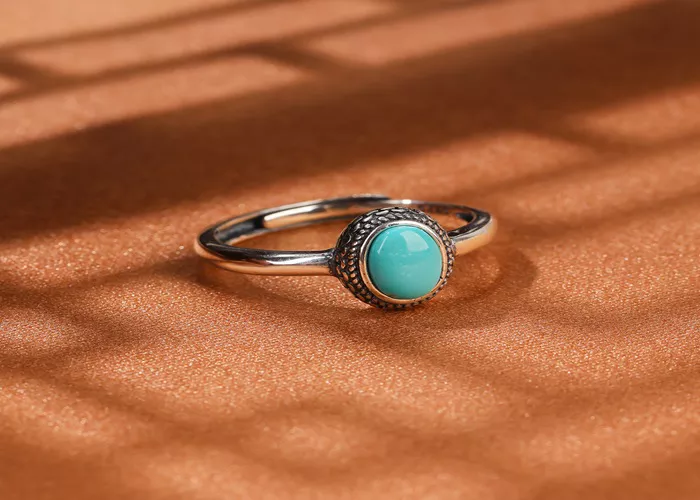Turquoise, a gemstone cherished for its unique colors ranging from deep blues to soft greens, has been adorned by people for centuries. Whether set in silver, gold, or other precious metals, turquoise rings are a popular choice for those seeking a piece of jewelry with both beauty and history. However, many owners of turquoise rings often have questions about the care and maintenance of this delicate gemstone, particularly about its water resistance. This article will provide a detailed introduction to whether turquoise rings can get wet, based on professional insights and practical advice.
The Unique Properties of Turquoise
Turquoise is a hydrated phosphate of copper and aluminum, often with traces of iron, chromium, and other elements that give it its distinctive colors. Its porosity, which varies from stone to stone, is a key characteristic that affects its durability and reaction to water. Some turquoise is relatively dense and compact, while others are more porous and prone to absorbing moisture and other substances.
The hardness of turquoise also varies, typically ranging from 5 to 6.5 on the Mohs scale. This means that it is softer than many other gemstones, such as diamonds or sapphires, and can be more susceptible to scratching or chipping. Therefore, special care is needed to maintain its beauty and integrity.
The Effects of Water on Turquoise
When considering whether turquoise rings can get wet, it’s important to understand the potential effects of water on the gemstone. Water can interact with turquoise in several ways, depending on its porosity, the type of water, and the duration of exposure.
Fresh Water
Fresh water, such as tap water or distilled water, generally has a minimal impact on turquoise. Short-term exposure to fresh water, such as when washing hands or showering, is unlikely to cause significant damage. However, prolonged immersion in fresh water can cause some porous turquoise to absorb water, leading to discoloration or cracking over time.
Salt Water
Salt water, whether from the ocean or a swimming pool, can be more harmful to turquoise. The salt and chemicals present in these waters can penetrate the pores of the gemstone, causing it to discolor, deteriorate, or even crack. Therefore, it’s advisable to avoid exposing turquoise rings to salt water whenever possible.
Other Liquids
In addition to water, other liquids can also affect turquoise. Oils, lotions, perfumes, and cleaning products can all penetrate the pores of the gemstone, causing discoloration or damage. Therefore, it’s important to avoid contact with these substances when wearing turquoise rings.
Can Turquoise Rings Get Wet?
The short answer to this question is: it depends. While some turquoise rings can tolerate brief exposure to water without significant harm, others may be more sensitive. Here are some factors to consider when determining whether your turquoise ring can get wet:
Quality and Origin
- High-quality turquoise, such as that found in the American Southwest, is often more dense and less porous, making it more resistant to water damage.
- Lower-quality turquoise, which may have been stabilized or treated to improve its appearance, may be more sensitive to water.
Treatment and Enhancement
- Stabilized turquoise has been treated with a resin or polymer to fill its pores and improve its durability. This treatment can make the gemstone more resistant to water damage.
- Treated turquoise, such as dyed or impregnated material, may be more susceptible to water-related issues, as the treatments can be affected by moisture.
Setting and Design
- The setting of the ring can play a role in protecting the turquoise from water. A bezel setting, which fully encases the gemstone, can provide better protection than a prong setting, which leaves more of the gemstone exposed.
- Rings with intricate designs or filigree work may be more difficult to clean and more prone to water damage due to their complexity.
Caring for Your Turquoise Ring
To ensure the longevity and beauty of your turquoise ring, follow these care and maintenance tips:
Avoid Water Exposure
- As a general rule, avoid exposing your turquoise ring to water, especially salt water or other harsh liquids.
- Remove your ring when washing hands, showering, swimming, or engaging in other activities that may expose it to water.
Store Properly
- Keep your turquoise ring in a dry, cool place away from direct sunlight and heat.
- Use a soft cloth or jewelry pouch to store the ring to prevent scratching or damage.
Clean Gently
- Clean your turquoise ring with a soft, lint-free cloth. Avoid using abrasive cleaners or harsh chemicals, which can scratch or damage the gemstone.
- If necessary, use a mild soap solution and warm water to gently clean the ring. Rinse thoroughly and dry immediately with a soft cloth.
Inspect Regularly
- Regularly inspect your turqoise ring for signs of wear, damage, or discoloration.
- Have the ring professionally inspected and maintained by a qualified jeweler to ensure its continued beauty and durability.
Handle with Care
- Be cautious when wearing your turquoise ring, especially in situations where it may come into contact with hard surfaces or other objects.
- Avoid exposing the ring to extreme temperatures or sudden changes in temperature, which can cause cracking or other damage.
Conclusion
In conclusion, whether turquoise rings can get wet depends on a variety of factors, including the quality and origin of the gemstone, its treatment and enhancement, and the setting and design of the ring. While some turquoise rings may be able to tolerate brief exposure to water without significant harm, others may be more sensitive. Therefore, it’s important to take proper care of your turquoise ring by avoiding water exposure, storing it properly, cleaning it gently, inspecting it regularly, and handling it with care. By following these tips, you can ensure the longevity and beauty of your turquoise ring for many years to come.
Related topic:
- Step-by-Step Guide to Crushed Turquoise Inlay Techniques
- Turquoise in Home Decor: 7 Creative Ways to Incorporate Its Beauty
- How to Wear Turquoise Jewelry


